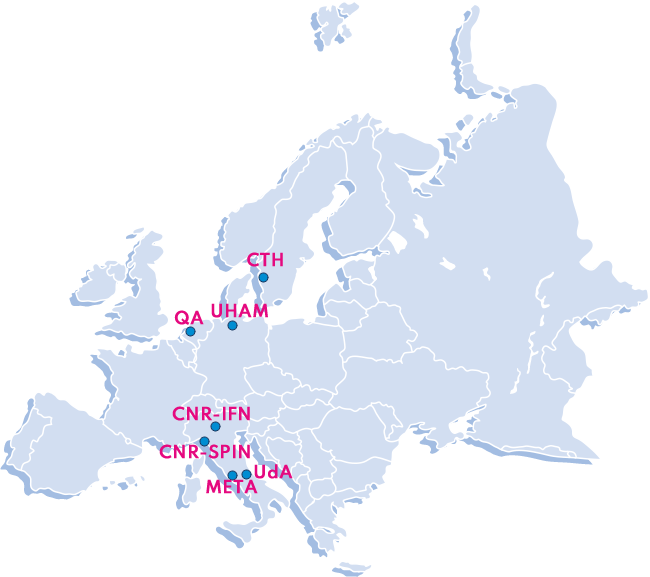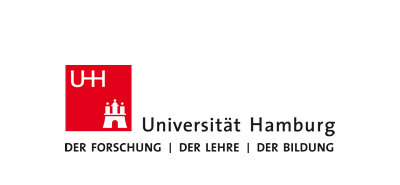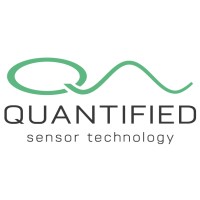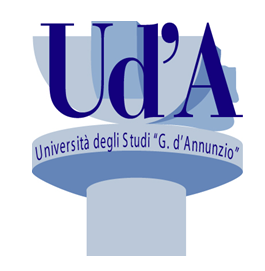| National Reasearch Council (CNR) CNR- SPIN Genoa, Italy CNR - IFN Milan, Italy GOTHENBURG, SWEDEN Hamburg, GERMANY Leiden, The Netherlands Italy, Pescara Italy, Rome |
|
The National Research Council (CNR) is the largest public research institution in Italy, performing multidisciplinary activities. Its mission is to perform research, to promote innovation and competitiveness of the national industrial system, to promote the internationalization of the national research system, to provide technologies and solutions to emerging public and private needs, to advice Government and other public bodies, and to contribute to the qualification of human resources. A significant contribution also comes from research associates: researchers, from Universities or private firms, who take part in CNR’s research activities. Part of the CNR activities are devoted to the dissemination of science, with the aim of stimulating public knowledge and excitement around the research activities of its scientific community.
CNR is participating the project with members from the CNR-SPIN and the CNR-IFN institutes.
This project will be conducted in CNR-SPIN unit of Genoa that will coordinate the project and IFN-CNR unit of Milan
- CNR-SPIN unit of Genoa is active in the deposition of thin oxide films by Pulsed Laser Deposition and has expertize in characterization techniques such as X-ray diffraction, RHEED, advanced scanning probe microscopy (AFM, STM), optical characterization (Kerr, Spectroscopic Ellipsometry), low temperature transport properties (magneto-resistance, thermal transport properties). CNR-SPIN Genoa has also experience in the design, micro/nanofabrication and modeling of thin oxide films devices and pioneered the fabrication of freestanding oxide devices through recipes and protocols developed in its laboratory. Part of the activities related to device characterization will be performed at Dipartimento di Fisica (DIFI) -University of Genova, where CNR-SPIN ordinarily operates through an agreement.
- IFN-CNR unit of Milano-PoliFAB has experience in the micro and nanofabrication of devices for various applications: optical devices based on group IV semiconductors, integration of multi-functional oxides on silicon, magnetic sensors based on tunneling junctions, silicon-based structures for MEMS and NEMS. Staff members have expertise in different nanostructures and device fabrication and integration techniques, such as: thin film deposition (by CVD, MBE, e-beam evaporation, magnetron sputtering, electroplating), optical and e-beam lithography, advanced scanning probe microscopy (AFM, PFM, MFM, CSFM), ellipsometry and prototype packaging. Some of the activities related to device fabrication will exploit the new micro and nano technology center of the Politecnico di Milano PoliFAB.
Chalmers University of Technology (CTH) was founded in 1829 and was transformed into an independent foundation in 1994. The annual turnover is approximately 250 MEUR, out of which 65% are related to research. Around 70% of the research funding is acquired in competition from external sources. More than 14000 people, including over 12000 undergraduates, work and study in the 18 Departments. About 1000 students are involved in PhD programs, with around 300 PhD and Licentiate degrees annually.
CTH has participated in EU funded research projects since 1990 and is involved in approximately 145 industrial and educational projects within different EU programs, yielding annual revenues of 11 MEUR. In 2010 CTH launched new strategic initiatives in Materials Science, Energy, and NanoScience and Nanotechnology as a result of new governmental funding.
The OXiNEMS group at Chalmers has a strong tradition in mesoscopic physics and in superconducting quantum devices at the nanoscale, in particular those based on HTS superconductors. The group has capabilities to pursue Pulsed Laser Deposition and nanopatterning of complex oxides like YBCO and to measure the quantum properties of mesoscopic devices. The group has also a long history of developing high-TC SQUID magnetometers for a variety of physics application area.
Chalmers Quantum Device Physics Laboratory (QDP) info: https://www.chalmers.se/en/departments/mc2/laboratories/QDPL/Pages/default.aspx
The University of Hamburg (UHAM) is one of the largest research-oriented universities in Germany with well above 40.000 students. The focus research area of nanoscience and nanotechnology has been established and continuously further developed since the early nineties with a strong involvement of the Departments of Physics and Chemistry. Several new Centers have been initiated in that field, including the “Microstructure Advanced Research Center Hamburg”, the “German Center of Competence in Nano-Scale Analysis”, the “Interdisciplinary Nanoscience Center Hamburg”, and the “Center of Applied Nanotechnology”. Initially, the focus has primarily been on semiconductor-based nanoscience and nanotechnology. Beginning with the new century, the focus has shifted towards nanomagnetism and nanospintronics. Several collaborative research programs have been established in that field, e.g. a Collaborative Research Center funded by the German Research Foundation (DFG) entitled “Magnetism from single atoms to nanostructures” and a Center of Excellence in the field of “Nanospintronics” funded by the Free and Hanseatic City of Hamburg.
The Scanning Probe Methods Laboratory of the Department of Physics at Hamburg University, was established by Prof. Roland Wiesendanger in 1993. Dr. Alexander Schwarz, who joined the group already in its founding year, coordinates all atomic force microscopy based activities. Since the early days the focus of the group has been on the development and application of advanced nanoanalytical tools and methods, combining highest spatial-, time-, and energy-resolution with spin sensitivity. A worldwide unique range of ultra-high vacuum (UHV), low-temperature, and high-field scanning probe systems has been set up, allowing local probing of the static and dynamic properties of materials on the nanometer and even atomic scale within a wide range of temperatures and external fields under well-defined environmental conditions.
Apart from instrumental developments, the group at Hamburg University has made several important discoveries in the field of interface-driven nanomagnetism using these dedicated mostly home-built instruments. Among other, the accomplishments of the group include the observation of complex chiral spin-structures like skyrmions in ultra-thin films, the development of single-atom magnetometry and the investigation of Majorana fermions in a monatomic magnetic chain on a superconducting substrate. In a collaborative effort with the quantum gas group of Prof. Klaus Sengstock they achieved a significant progress regarding sensitive optical detection of vibrating mechanical oscillators close the quantum ground state.
Hamburg people>>
Quantified Air B.V. (QA) is a spin-off company from Delft University of Technology, with an office and a lab based in Leiden, The Netherlands. The company develops MEMS sensors and sensor systems for a variety of applications, including climate sensing. It is built upon 15 years of academic experience in micro- and nano-electromechanical systems and related instrumentation, matched with an equal experience in business development.
The University G. d’Annunzio of Chieti-Pescara - UdA is a public university founded more than 30 years ago. The University is made of two campuses, one located in Chieti and the other in Pescara. The University comprises 13 Departments (among which the Department of Neuroscience, Imaging and Clinical Sciences - DNISC), 2 Schools and 2 Centres (one of which is the Institute for Advanced Biomedical Technologies – ITAB). UdA personnel comprise about 700 professors and 160 technical-administration staff, and carries out teaching duties for about 29.000 students.
- The Department of Neuroscience, Imaging and Clinical Sciences (DNISC)includes 58 professors with different background, such as physicists, engineers, physicians and psychologists and 10 technical-administration staff involved in multidisciplinary projects involving: physiology & pathophysiology, neurological, psychopathological & rehabilitation science, general, social & developmental psychology, imaging diagnostic, interventional radiology & radiotherapy, instrumentation methods & models, cardiovascular & pharmacology science.
- The Institute for Advanced Biomedical Technologies (ITAB) is a Centre founded by EU in 1991, devoted to the development of instrumentation for biomagnetism, of methods for biomagnetic data analysis and multimodal functional brain imaging, and to their application to the study of the healthy and affected human body.
ITAB is an interdisciplinary centre, operates in synergy with DNISC and includes 18 professors and researchers (physicists, engineers, neuroradiologists and neuropsychologists) dedicated to the implementation of instruments, the design and implementation of data analysis methods, the design of experiments and the interpretation of the related results, all applied to basic and clinical neuroscience research through anatomical and functional imaging.ITAB is equipped with different non-invasive imaging techniques such as VLF-MRI (10 mT for small samples/animals implemented during the MEGMRI project, installed in a shielded room, convertible into a ULF-MRI system), LF-MRI (0.2 T for limbs/small animals) and HF-MRI (1.5 T and 3 T Philips Achieva, for humans), a 153-channel MEG scanner hosted in a good quality magnetically shielded room, Transcranial Magnetic Stimulation with simultaneous EEG, High density EEG instrument, InfraRed camera, and Near Infrared Spectroscopy equipment.
META Group is an international advisory and investment firm dedicated to the creation and growth of fast growing companies, for the wealth of open and dynamic regions with pioneering integrated approach to foster knowledge intensive entrepreneurship at macro & micro scale. The company has 20 years of experience in bringing knowledge to market, training many researchers and entrepreneurs in Europe and helping them to better exploit the results of their project as well as to better commercialize their ideas.
META is member of relevant association of investors such as BAE Business Angels Europe and AIFI (Italian Association of Private Equity and Venture capital). It is also member of relevant European associations of innovators such as EBN (European Business Innovation Centres Network), INSME (International Network of SMEs) , IASP (International Association of Science Parks).










 This project has received funding from the European Union’s Horizon 2020 research and innovation programme under grant agreement N.828784.
This project has received funding from the European Union’s Horizon 2020 research and innovation programme under grant agreement N.828784.